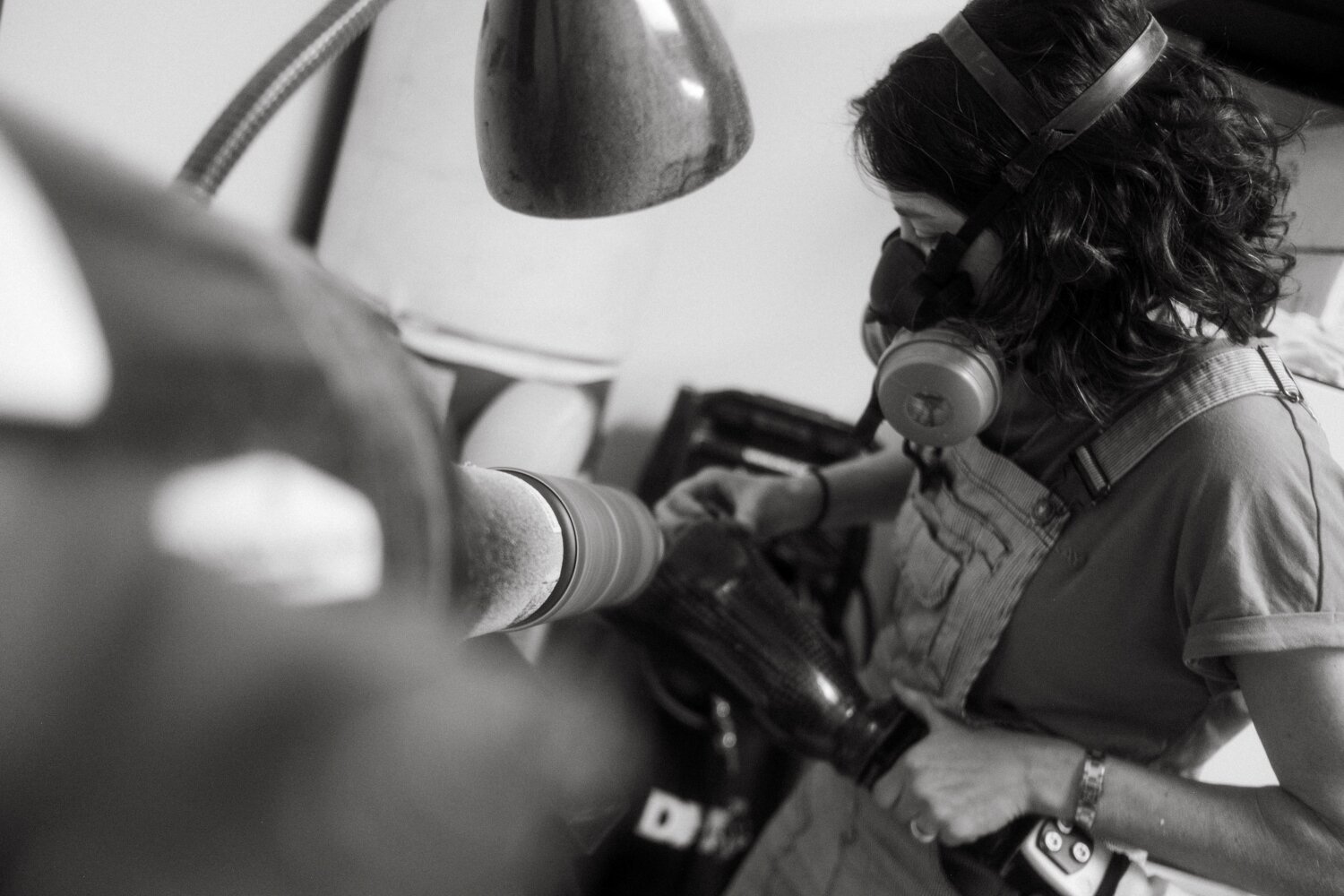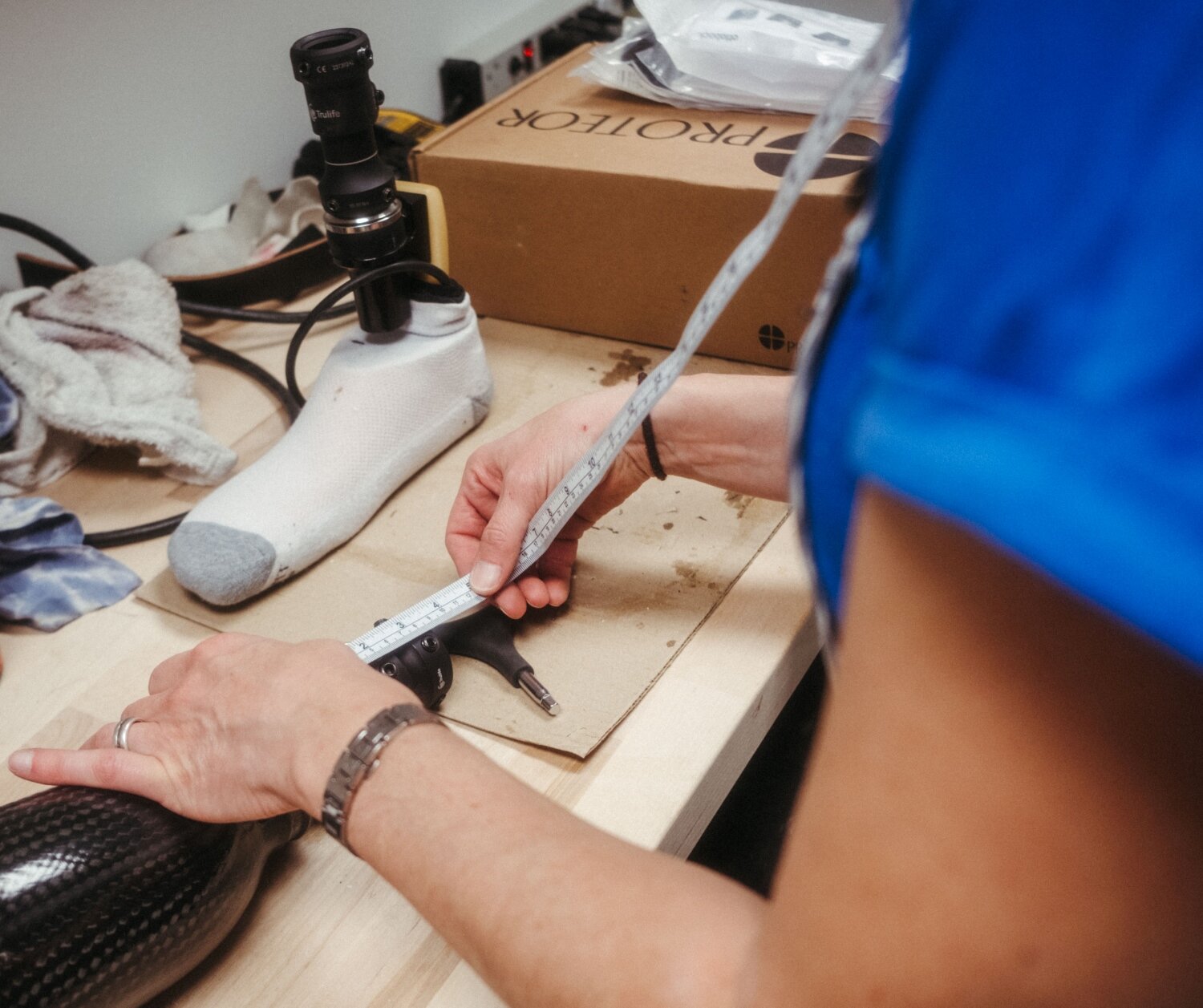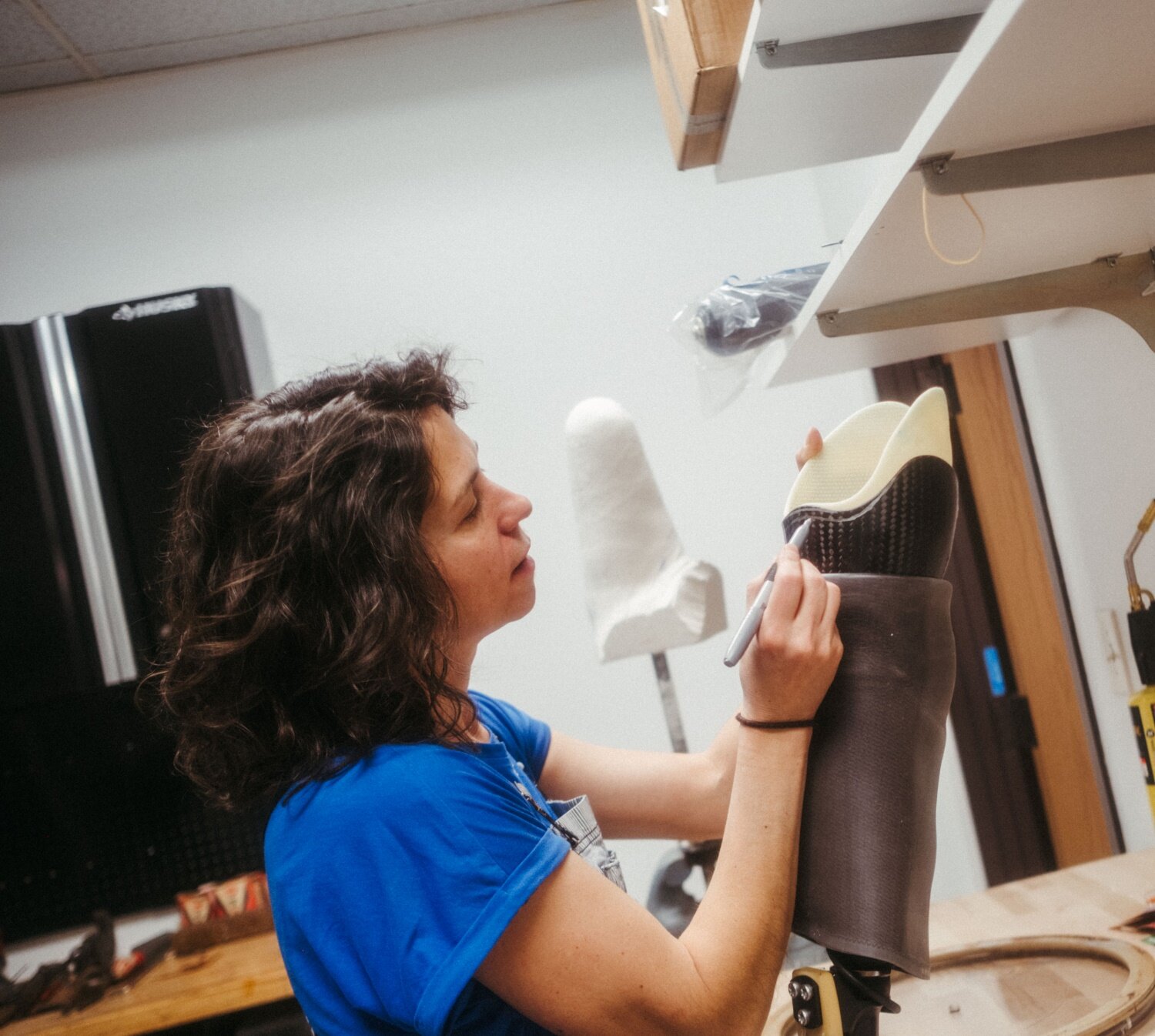You’ll never see us: Artistry meets science in a prosthetist’s workshop

BOULDER, Colo. — In a small workshop at the back of her office, Angela Montgomery uses a grater-like tool to shave down the sculpture she’s working on. As the white shavings fall into the trash can, the only sounds in the studio are her breath and the back and forth of the shredder rasp tool.
Montgomery isn’t working on a sculpture for an art installation — she’s working on a mold of the right leg for one of her clients.
“My whole life, I’ve always been fascinated with human movement,” said Montgomery, who is a certified prosthetist-orthotist.
For the past 22 years, Montgomery has fabricated and assembled prosthetics as well as braces and other mobility aids for people along the Front Range.
A prosthetist makes artificial limbs, while an orthotist makes braces and splints to support certain body parts.
Montgomery said her fascination with this field bloomed when she was in college.
“I was an athlete in college and when I was 19, I got to train at the Olympic Training Center. There, we had nutritionists, trainers, sport psychologists and that’s when I fell in love with biomechanics,” she said.
After earning her degree in health and sport sciences at the University of Oklahoma, Montgomery pursued a graduate degree in prosthetics and orthotics and started her career in Boulder, Colorado, where she worked for Hanger Prosthetics and Orthotics until 2015.
She now operates her own business. At the start of this year, Montgomery opened an office in Boulder.
“I’ve had the grace from so many of my patients that are willing to go to see me wherever I go,” said Montgomery, whose business slowed down as a result of the COVID pandemic and raising her two children.

Montgomery trims down a prosthetic leg that was causing discomfort for a patient.
Photo: Peter Vo, Rocky Mountain PBS
“So it's been cool to now be opening this. I'm super excited to ultimately start to chip away at my dream of having a community space,” she said.
On a typical day, Montgomery meets with patients to discuss their needs, makes molds and puts together artificial limbs.
Conversations with patients are in-depth and personal. Montgomery says that the best way to really address someone’s mobility needs and help them reach their goals is to understand who they are and what makes them happy.
“It is truly a team effort. They know their body better than anybody else. I know the art and science of prosthetics, but I question them throughout the process, like, am I reiterating your goals? Are we headed in the right path?” Montgomery said.
The process to make an artificial limb fit is highly individual to each person.
On the day Rocky Mountain PBS visited Montgomery, she was working to alleviate discomfort that a patient was experiencing from his artificial leg. She measured and grinded down the prosthetic multiple times before he felt relief.
“It is a journey,” she said of the circuitous trial and error process of forming and fitting a prosthetic.
“I think with patience, perseverance and this collective effort, we get to a point where people are really happy and doing the things that they want to do,” she said.
Working on molds, putting together supports and fabricating prosthetics puts Montgomery at peace.
“I can just blast music and focus and kind of get really hyper focused into something where I can envision that person's body,” said Montgomery.

Montgomery uses a tape measure to make sure the prosthetic leg is at the right length.
Photo: Peter Vo, Rocky Mountain PBS
Montgomery meticulously works on her sculptures during this time, making sure every piece is fine-tuned and curated with beauty.
“These things should look sexy. They should look good. They’re expensive devices,” she said.
This intersection between science and art has been a forefront in her work. Her profession blends together, art, psychology, science, craftsmanship and relationships. She said her work should reflect that.
In honor of her belief that prosthetics should be beautiful, Montgomery has started to finish the inside of her devices red, playing off the Christian Louboutin red bottom heels.
A lot of her work is under the radar and Montgomery is also involved in advocacy work for people with disabilities.
“Throughout my years in the profession I've been accepting some things just the way they are. Our healthcare system is the way it is,” said Montgomery. “ But I saw some examples of people not accepting that and kind of standing up and fighting for change. And it’s been really inspiring to me.”
Prosthetic legs can cost thousands of dollars, sometimes up to $70,000. That puts them out of reach for many people with disabilities.
Not all prosthetics are suitable for all activities, either. For example, a prosthetic for basic needs wouldn’t function well for weightlifting, whereas a prosthetic for weightlifting wouldn’t benefit someone who wants to run.
“So to think that someone has to use the same device for all activities is ludicrous,” Montgomery said. “And then to think that someone isn't afforded the opportunity to do those activities is ludicrous.”

There are usually multiple corrections that Montgomery makes to a prosthetic leg to make sure someone is comfortable using it.
Photo:Peter Vo, Rocky Mountain PBS
Montgomery was one of the people who spearheaded a Colorado bill that passed in the general assembly that would require insurance companies to cover the cost of prosthetics for recreational and physical activities.
The legislation is effective as of August 2023, and Montgomery says that insurance companies will start adhering to the change in 2025.
“Exercise is what helps us be healthy — mentally and physically, like that is not rocket science. So I think helping change the landscape of our health care industry to create verbiage in the law that states that exercise as part of our essential health benefit is a huge precedent to set,” Montgomery said.
She says that this is a step in the right direction but there’s still more work to be done. The journey to make these changes in healthcare is similar to the journey that she embarks with her patients.
Colorado’s bill is one of the first in the country addressing recreational prosthetics. Since the bill passed, Montgomery and other advocates have been acting as coaches for other states–including Idaho, Arizona, Wyoming and Utah–that are interested in passing similar measures.
“We hope to make this just a law of the land so that someday, our kids will not know anything different.” Montgomery said.
Peter Vo is a multimedia journalist at Rocky Mountain PBS. Petervo@rmpbs.org.
